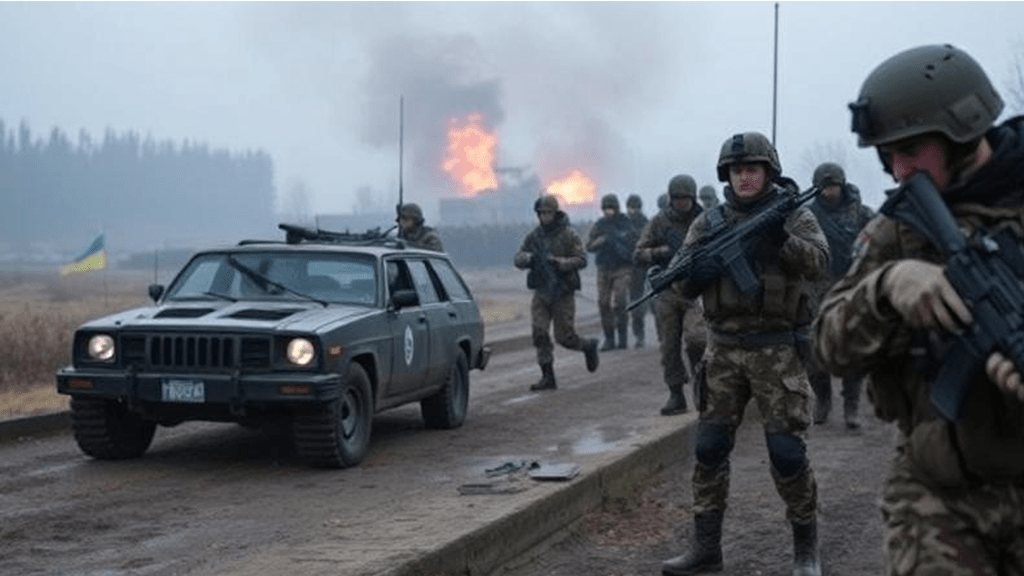
Why Skills-First Leadership Is Replacing the Ivy League Playbook in the C-Suite
The old prestige pyramid—where Ivy League degrees and blue-chip consulting backgrounds paved the way to the CEO seat—is cracking.

March 06, 2025: NATO is increasing military aid to Ukraine as Russian forces escalate their offensive, targeting key infrastructure and frontline positions. The latest assistance package includes advanced air defense systems, long-range missiles, and armored vehicles to bolster Ukraine’s defense capabilities.
Several NATO member states have pledged additional munitions, artillery, and drone technology, responding to Ukraine’s urgent requests for reinforcements. The U.S. and European allies are expediting deliveries of Patriot missile systems and precision-guided weapons to counter intensified Russian missile strikes on major cities. The UK and Germany also provide long-range Storm Shadow and Taurus missiles, expanding Ukraine’s ability to strike Russian supply lines.
Russia has increased the scale of its attacks, focusing on energy facilities, military supply routes, and urban centers. Ukrainian officials report a surge in missile and drone strikes, putting further pressure on air defense networks. Frontline cities in Donetsk and Kharkiv remain under heavy bombardment, with Russian forces attempting to gain strategic ground before Ukraine can receive reinforcements.
Logistics remain a challenge. Ukraine’s military leaders warn that delays in Western aid could impact battlefield operations as Russian forces exploit gaps in ammunition supplies. NATO defense ministers have emphasized the need for long-term support strategies, including joint ammunition production agreements and increased military training programs.
The European Union has also expanded financial and logistical support, approving a new aid fund for military equipment procurement. NATO has reinforced intelligence-sharing efforts to track Russian troop movements and predict potential escalation points.
Moscow has condemned NATO’s involvement, warning of “serious consequences” if Western weapons continue to be used against Russian territory. Kremlin officials have hinted at possible retaliatory measures, raising concerns over broader geopolitical instability.
The effectiveness of NATO’s latest military aid efforts will depend on the speed of delivery and Ukraine’s ability to integrate advanced weaponry into ongoing counteroffensives. Ukraine could stabilize key defensive positions and prevent further territorial losses if support remains consistent.

The old prestige pyramid—where Ivy League degrees and blue-chip consulting backgrounds paved the way to the CEO seat—is cracking.

Loud leaders once ruled the boardroom. Charisma was currency. Big talk drove big valuations.

But the CEOs who make history in downturns aren’t the ones with the deepest cuts

Companies invest millions in leadership development, yet many of their best executives leave within a few years. Why?

The most successful business leaders don’t just identify gaps in the market; they anticipate future needs before anyone else.

With technological advancements, shifting consumer expectations, and global interconnectedness, the role of business leaders

Following a distinguished Law Enforcement career Joe McGee founded The Securitatem Group to provide contemporary global operational specialist security and specialist security training products and services for private clients, corporate organisations, and Government bodies. They deliver a wide range of services, including complete end-to-end protection packages, close protection, residential security, protection drivers, and online and physical installations. They provide covert and overt investigations and specialist surveillance services with a Broad range of weapons and tactical-based training, including conflict management, risk and threat management, tactical training, tactical medicine, and command and control training.

Jay Wright, CEO and Co-Owner of Virgin Wines infectious energy, enthusiasm, passion and drive has been instrumental in creating an environment that encourages talent to thrive and a culture that puts the customer at the very heart of every decision-making process.

Fabio de Concilio is the visionary CEO & Chairman of the Board at Farmacosmo, a leading organization dedicated to mental health and community support services. With a deep commitment to identifying and meeting customer needs, Fabio ensures that high standards are maintained across the board.

Character Determines Destiny – so said Aristotle. And David CM Carter believes that more than anything else. For David, it has been numerous years of research into codifying Entelechy Academy’s 54 character qualities that underpin everything he stands for as a leader and teacher.


Leave us a message
Subscribe
Fill the form our team will contact you
Advertise with us
Fill the form our team will contact you